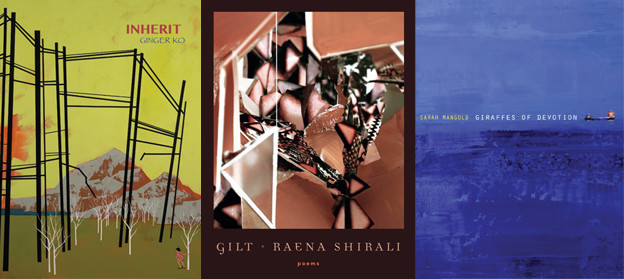
Gaps in history
Julia Bloch

Editor Julia Bloch reviews three recent poetry titles invested in the gap: Inherit by Ginger Ko, Gilt by Raena Shirali, and Giraffes of Devotion by Sarah Mangold.
Inherit, Ginger Ko (Sidebrow, 2017)
Ginger Ko’s investigation of intergenerational care and violence insistently opens the page to contradiction and contrast: suggesting in one poem the world-making implications of motherhood with a line like “each time you carried in you something larger than yourself,” Ko continues: “mothers never mute but rivalrous.” The book is divided into two sections, “Lacunae” and “Sequelae,” suggesting the ways these poems might locate and seek to fill the gaps in history and memory as well as how they document the inheritance of injury to self and family, across lines of immigration and flight. The first section’s poems are each followed by a “translation” that seems to condense and crystallize the poem into an image slightly removed from what came before, often with startling effect: a poem beginning “I came back from Japan when the Gold Banner Manchurians were labeled as class enemies” is translated into “This way and that she jerked the doll’s dress, stuffing the hem / into the menstrual hole.”
Gilt, Raena Shirali (YesYes Books, 2017)
Raena Shirali’s debut collection from YesYes Books is shot through with concrete images that shape and refract each poem’s surface, much like the way the book’s title serves as both object and verb (“gilt” being both a thin layer of gold and a variant of the verb “to gilt” as well as, of course, a homonym for guilt): the poems are as visual as they are internal, as in the modular “if i wrap myself in gold,” broken into sections titled after garments and objects of varying value: “Sari,” “Sequins,” “Shadow,” and “Leaf.” Anaphora often creates narrative tension resolving into ambiguous beauty, as in the final lines of “The Downing”: “The way it stormed // all summer. The way I drank rainwater with the pills, / gagged down PediaSure, became a turbid mirror. The way // I made myself stop singing. The way loving you felt / like swallowing gold.” Or the scenes of racial violence in “DARE I WRITE IT,” in which the line winnows down to its most spare human parts: “dare i sit on the roof of a brick house / with white girls & laugh when they laugh at that story. dare i / coat my eyes in black. dare i chameleon. dare i write. dare i girl.”
Giraffes of Devotion, Sarah Mangold (Kore Press, 2016)
Constructed via erasure and collage from an oral history transcript provided by the US Naval Institute in 1986, a transcript that records Mrs. Roy Smith’s time spent with her husband while he was stationed in the mid-1920s in Shanghai, Giraffes of Devotion investigates the long reach of US empire in the Asian Pacific. It opens with an epigraph from Robert Duncan’s “Imagining in Writing”: “This is a description of a continent of living: lions, / streetcars, explosions, newspapers like flies, flies / like newspapers, giraffes of devotion, sentences in / locomotion as contrived as giraffes[.]” A modest disavowal runs through many lines in the early part of the book (“not that I’m comparing // ourselves with roses and lilies / but I mean all right / are you not going to eat an oyster”) before breaking into procedural chunks of words or phrases plucked out and alphabetized in tight paragraphs or stanzas (a prose poem that reads: “Chinamen climate comic / command Commander Smith / commanding commanding / courts cousin date dates death / December”; a three-line poem that reads “hazardous duty pay / hostile fire pay / career incentive pay”). The effect is to mix military-style tourism (or tourism-style militarism) with the shatteringly ordinary so that the “description” in Duncan’s quote is revealed as the operations of empire: “How will I get home / I’m only telling you the alarming spots / I’m not telling you all the good spots”; later, “the methods of teaching history / by which I mean each day is a pearl to be prized.”